Have you ever wondered what a mom blogger is or if you’d like to become a mommy blogger yourself?
This article discusses who mom bloggers are, how they make money, and how to start a blog yourself.
If you run a business and are thinking about partnering with a mom blogger, stick around!
- The Best Mom Bloggers (Overview)
- Who Is the Mom Blogger?
- Who Is Reading the Mom Blog, and Why?
- Top Mom Bloggers
- Other Types of Mom Blogs
- Mom Blogs and Earnings
- Mom Blogs and Digital Marketing
- How Has Mom-Blogging Evolved?
- How Do You Become a Mom Blogger?
- 7 Blog Niches Perfect for Busy Parents
- 1. Budgeting & Personal Finance
- 2. DIY Projects
- 3. Home Improvement
- 4. Travel & Outdoors
- 5. Parenting
- 6. Food
- 7. Lifestyle
- Frequently Asked Questions
- Wrapping Up
The Best Mom Bloggers (Overview)
We’ve included an overview of our top picks below. For detailed information on each pick, scroll down.
- At Home With Natalie
- Baby Boy Bakery
- Rage Against the Minivan
- Brittany Robertson
- Cat and Nat
- Juggling the Jenkins
- Pregnancy After Loss Support
- Mommy Shorts
Who Is the Mom Blogger?
Mom bloggers are mothers who blog about raising a child – or several children – and their experiences.
They often write about parenting advice, mom life hacks, and product reviews.
Many mom bloggers also have social media accounts to share content from their blogs.
While they have similarities, there are many differences between the mom bloggers’ lives.
This affects what they choose to talk about on their blogs and their audiences.
Some of these bloggers have a more humorous tone.
They make light of their crazy, hectic, and unpredictable life with kids.
In contrast, other bloggers might have a more informational tone.
They may choose to share real-life problems or discuss potential solutions.
They also offer smart mom ideas.
Mom bloggers strive to create a like-minded community.
They do this to support other moms on their journey.
Who Is Reading the Mom Blog, and Why?
There are a few different types of mom bloggers.
The specific variety will determine who might be most likely to read their blog.
Some mom bloggers write for other mothers.
Some of them write for both parents and non-parents.
And some mom bloggers write for an audience of fathers.
People enjoy reading mom blogs because they can learn from the experiences of other moms.
They can get product recommendations that are relevant and helpful to them.
They can also prepare for motherhood if they are trying or expecting.
Some readers may appreciate not feeling so alone in the stress of being a stay-at-home mom.
Meanwhile, some readers may appreciate not feeling so alone in the daily grind of being a working mom.
Top Mom Bloggers
Now you understand what a mom blogger is, why people find their content valuable, and how they make money.
Next, we’ll discuss some of the top mom bloggers online today.
1. At Home With Natalie

Natalie is a mom of six who blogs about motherhood, recipes, home design, and events.
Her blog focuses on affordable and attainable home items.
This might include appliances, kids’ toys, and merchandise for the everyday mom.
Natalie’s best friend died at the hands of her estranged ex-partner.
Due to this tragedy, she also emphasizes the importance of domestic violence awareness.
2. Baby Boy Bakery
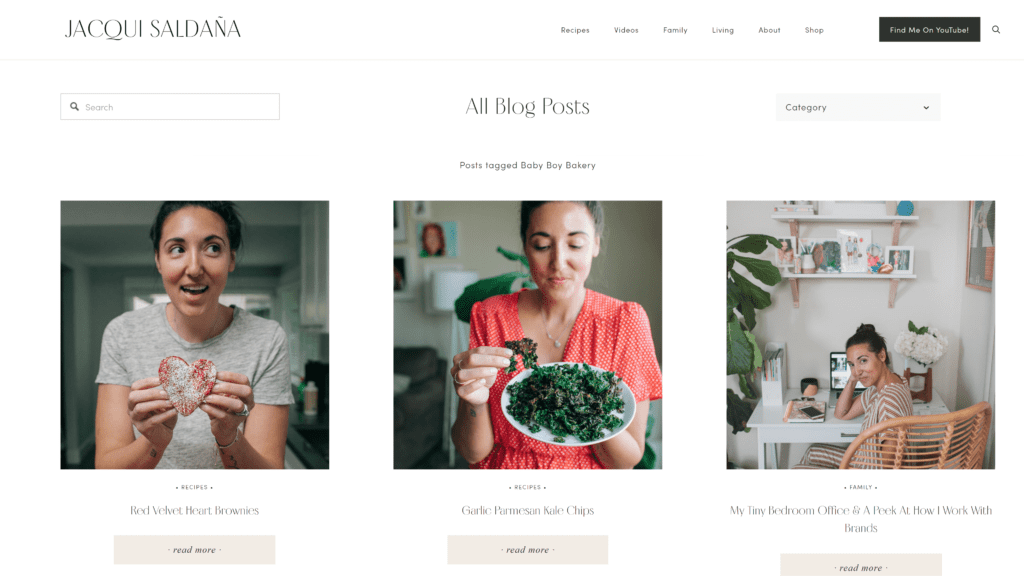
Jacqui Saldana runs a blog that emphasizes at-home recipes for moms.
She includes recipes for delicious and nutritious meals throughout the day.
She writes about recipes for various healthy, tasty dishes.
Recent recipe articles include garlic parmesan kale chips to sweet potato rolled tacos.
Her Baby Boy Bakery blog also speaks on her family life, brand deals, and general musings.
3. Rage Against the Minivan
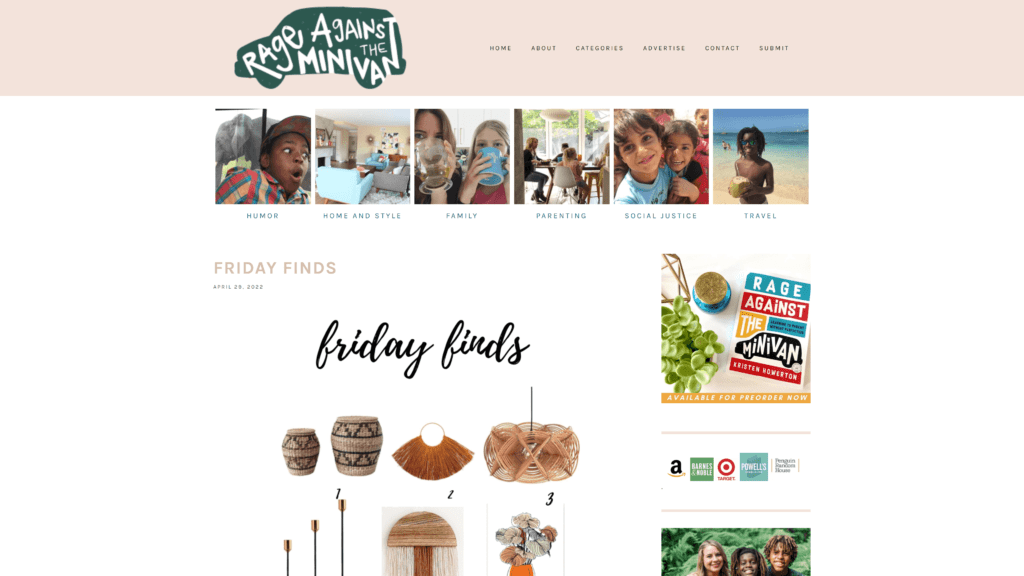
Kristen Howerton created Rage Against the Minivan.
This is a mom blog filled with the personality and humor you might’ve assumed from the name.
She writes an authentic family focus blog about parenting, home design, travel, etc.
Further, her blog is special in that it has a whole section dedicated to social justice issues.
These topics include Black Lives Matter, white privilege and race, faith, and politics.
4. Brittany Robertson
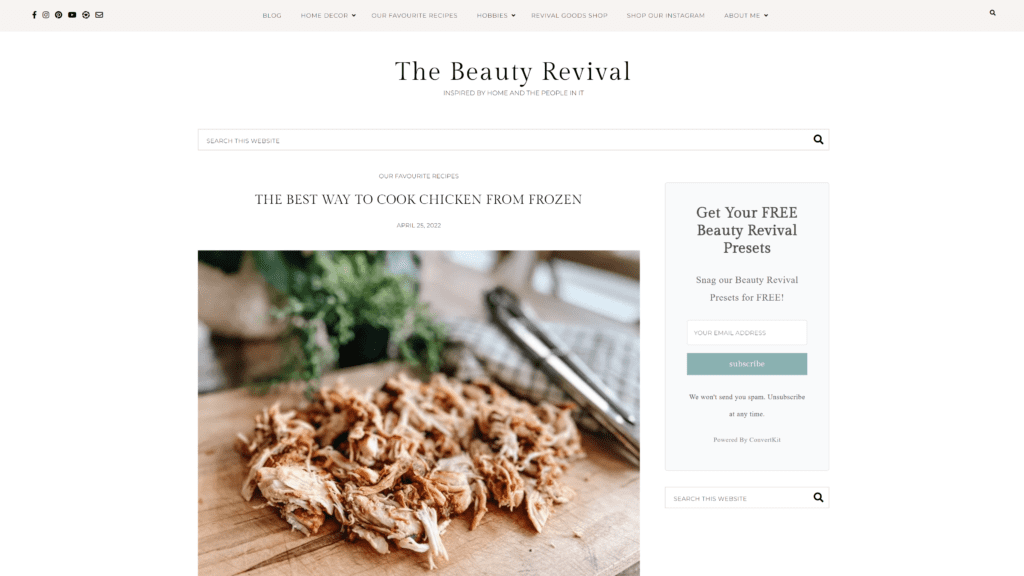
Brittany Robertson had a self-titled blog until partnering with Jade Robertson.
Together, they created a blog called Beauty Revival.
Beauty Revival is all about affordable and attainable home decor.
Topics include decorating tips, home tours, and room makeovers.
The blog also has a section that includes their favorite recipes.
These recipes create an inviting space for family and friends to gather together.
5. Cat and Nat
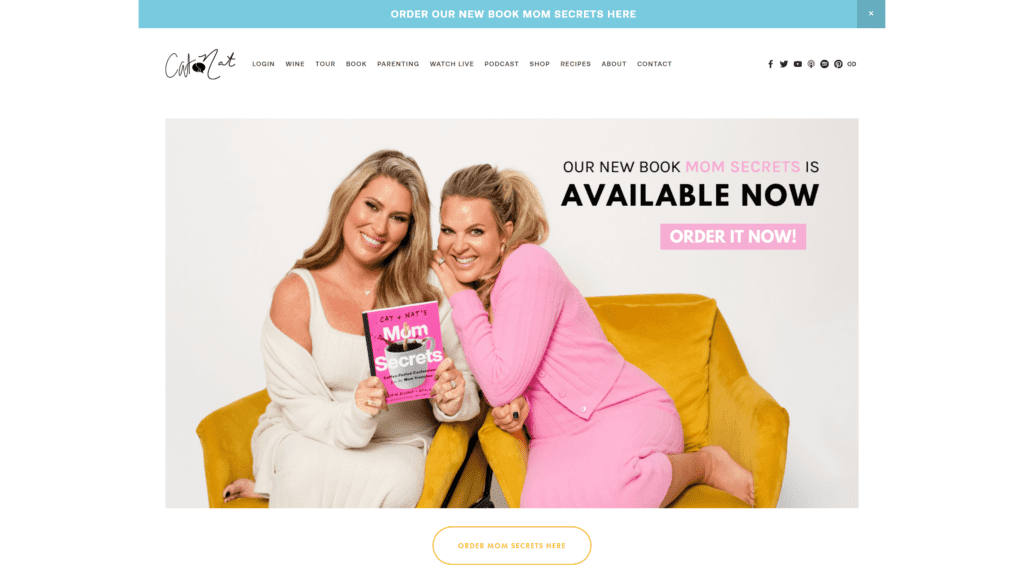
Cat and Nat are two moms that teamed up to create one stellar mom blog.
Their blog is about every motherhood topic you can imagine.
Their mission is to bring both humor and a sense of community to their female readers.
These mom bloggers discuss topics related to parenting, food, and wine.
They have gained enough success to write books, sell wine, create a podcast, and even go on tour.
6. Juggling the Jenkins

Tiffany Jenkins is the creator of the blog Juggling the Jenkins.
She is not only a lifestyle blogger and content creator.
She is also a podcaster, author, speaker, and comedian.
Her blog and books range in tone from humorous and goofy to solemn.
She is not afraid to discuss the real struggles of life and highlight other people’s stories.
Several popular TV shows featured Tiffany Jenkins.
The Doctors, The Today Show, and Good Morning America are on this list.
She is a true celebrity in the eyes of many.
7. Pregnancy After Loss Support

Pregnancy After Loss Support, or PAL mommy bloggers, is a much-needed blog for many.
These bloggers have lost babies through miscarriage, stillbirth, or infant death.
This mom blog is a supportive and safe community for moms who have experienced this type of loss.
It caters to those who are pregnant again after they’ve experienced the loss.
This is a unique challenge in and of itself, fraught with a range of mixed emotions.
The PAL mommies share their stories and offer support to one another.
They also provide resources and advocacy for anyone who might need them.
8. Mommy Shorts

Mommy Shorts is a lifestyle blog that Ilana Wiles created.
She’s a hardworking mom from New York City who writes about various subjects.
Topics include travel around NYC, parent struggles and solutions, and social justice issues.
She covers many specific points within those categories.
She has blog posts about playtime, mealtime, misbehavior, school, pregnancy, and more.
Finally, Ilana provides holiday gift guides.
She also has her own Mommy Shorts merchandise line.
Other Types of Mom Blogs
Some mom blogs cater to moms interested in specific., more niche topics.
We’ll discuss two other types of mom blogs here: black mom bloggers and military mom bloggers.
Black Mom Bloggers
Some popular black mom blogs are Latonya Yvette, Successful Black Parenting Magazine, and Mommy Talk Show.
What Are Black Mom Bloggers?
Black mom bloggers often write about their unique experiences as black mothers.
In doing so, they provide support and advice to other black mothers.
What Topics Do Black Mom Bloggers Cover?
Black mom bloggers write about a range of topics.
These topics include motherhood, parenting tips, fashion, fun family activities, etc.
Military Mom Bloggers
Some popular military mom blogs are Military Spouse, The Military Wife and Mom, and Army Wife 101.
What Are Military Mom Bloggers?
Military mom bloggers are mothers who write about their experiences being military parents.
What Topics Do Military Mom Bloggers Cover?
Topics covered by military mom bloggers include parenting, deployment, moving, and more.
These mom bloggers offer support and advice to other military families.
They also write about their unique experiences as military spouses.
Mom Blogs and Earnings
We’ve touched on how moms can make money through blogging.
But now, we will take a more in-depth look at the earning potential of mom blogs.

Do Mom Bloggers Make Money?
Yes, mom bloggers can make a significant amount of money if they are successful.
Mom bloggers who can grow their blog and audience can make a full-time income from their blog.
Successful mom bloggers can make six figures or more.
It takes hard and consistent work to make a significant living from mom blogging.
Though, it is doable with time, effort, and strategy.
How do Mom Bloggers Make Money?
Mom bloggers can make money through a variety of methods.
They often make money through advertising, sponsored content, and partnerships.
They also make money from affiliate marketing and selling their own products.
Mom bloggers can also make money through speaking engagements and consulting work.
[box_with_button title=”Did You Know?” link_url=”https://bloggingtips.com/amazon-affiliate-program/” link_text=”About the Amazon Affiliate Program”]
The Amazon Affiliate program is one of the easiest ways to earn money with a blog. It’s how many bloggers monetize their audience, and takes very little time to set up.
[/box_with_button]
Mom Blogs and Digital Marketing
We’ve shared how mom bloggers can make a good income.
This is especially true if they are able to promote their content and gain a decent following.
For this, digital marketing has to play a significant role.
In this section, we’ll discuss what digital marketing is.
We’ll also share how it helps mom bloggers grow their online businesses.
What is Digital Marketing?
Digital marketing is the strategized process of promoting your products or services online.
It encompasses a range of activities.
Digital marketing includes SEO, content marketing, social media marketing, email marketing, and more.
Digital marketing is a crucial part of any online business.
It can help you reach a wider audience to promote your products, affiliate links, or services.
Bloggers may have a more challenging time without a comprehensive digital marketing strategy.
They might find it challenging to grow their audience, thus growing their business.
What Does Mom-blog Digital Marketing Look Like?
Mom-blog digital marketing entails first creating great content.
Then, it entails promoting that content through social media and email.
It also often includes using SEO to help people find your content.
Content tends to involve valuable blog posts that serve a specific purpose.
They might be helpful, humorous, relatable, informative, entertaining, emotional, etc.
This value is what prompts readers to follow along.
They are getting something out of reading the blog.
Once the bloggers have a following, they can build an email list with people who support them.
Additionally, bloggers use email lists to promote more products, services, or affiliate links.
We’ll discuss how digital marketing comes into play in the following section.
Where Does Digital Marketing Come Into Mom Blogs?
Digital marketing comes into play with mom blogs in a few different ways.
1. Digital marketing can help mom bloggers promote their content to a wider audience.
SEO helps their blog content show up in search engines like Google.
Further, social media marketing helps bloggers promote their content.
They can use platforms like Facebook, Twitter, and Instagram to do so.
Digital marketing allows mom bloggers to build an email list of subscribers.
This list helps to promote products, services, and affiliate links.
Sometimes bloggers want to only share more personal stories with their true fans.
2. Email marketing is a fantastic tool for mom bloggers.
Through email marketing, they can share in-depth stories with their followers.
These stories inspire a feeling of exclusivity for the followers.
Further, this exclusivity may influence greater and longer-lasting loyalty.
3. Digital marketing can also help mom bloggers sell their own products and merchandise.
They will likely use the same methods to promote their own products as they do for partnerships.
These methods include website/blog, social media, and email.
To recap, digital marketing trends are successful when mom bloggers have relatable content.
They should also have great product pages on their website.
Aligned email and social media systems help as well.
Finally, a comprehensive marketing strategy on various channels and platforms is crucial,
How Has Mom-Blogging Evolved?
When mom bloggers first started, they focused their writing on other moms – blogging to share their experiences and advice.
Mom blogging has evolved over the years, and mom bloggers now write about various topics.
They still write about motherhood and parenting, but they also write about travel, food, fashion, and more.
Mom bloggers have also become more successful, with many now writing books, creating merchandise lines, and starting successful podcasts.
They may also attend conferences, get interviewed on TV, and even go on tour.
How Do You Become a Mom Blogger?
If you’re a mom and you’re interested in starting a mom blog, the first thing you need to do is create content.
You can write about whatever you’d like, but it’s helpful if you focus on a specific niche.
Once you have some content, the next step is to start a blog and choose a platform.
There are many different blogging platforms on the web.
Some of the most popular ones are WordPress, Blogger, and Tumblr.
Once you’ve chosen a platform and started your blog, the next step is to promote your content.
You can do this by sharing your blog posts on social media or posting on other blogs.
You can also engage in online communities related to your niche.
7 Blog Niches Perfect for Busy Parents
One of the most important steps to starting a successful blog is choosing the right niche, or topic, for your site.
I’ve made just about all the mistakes you can in this area, from going too specific to starting too broad.
In general, here’s my advice:
- don’t choose a niche simply because it’s your passion
- don’t choose a niche simply because you can make more money
- choose a niche that has a ton of questions, problems and online searches
- choose a niche related to the group of people you want to help
Making your passion into a blog doesn’t guarantee success, and neither does following the money just to make money.
You need to choose a niche that has a lot of questions and problems so that you can answer those problems with your content. Those niches translate into the types of blogs that make money.
What you should focus on: providing value to readers by solving even the smallest of problems.

What problems do you want to solve?
Whose questions do you want to answer?
That’s the best way to pick your niche.
How to Choose Your Blog Niche
There are a number of factors to consider when choosing a blog niche, including:
- is there an audience for the content?
- do people have a lot of problems or questions in the niche?
- are there products, brands or info you can feature as solutions?
- is there enough content demand to sustain a blog for years?
- are you interested enough in the topic to write about it for months or years?
You want to make sure you pick a niche where there’s actual demand for content and there are problems that need to be solved, however small.
You also want to make sure there are products that you can suggest as solutions, and that you can monetize your blog with those products. A good way to find monetization ideas is to look at blog income reports.
For example, if the problem is people wanting to figure out what to pack on a backpacking trip, then the solution might be an ebook on how to pack light, or the solution may be the backpacking products themselves.
If you take anything away from this post, make it this:
The best blog niches have the most (or most important) problems or questions.
Here’s what I mean: every Google search is a small problem someone’s experiencing.
They’re looking for a restaurant in Chicago, or figuring out how to fix their toilet themselves, or trying to find a way to feed their family for less money.
Even fun, entertaining searches are small problems that need solutions.
So, the best niches for bloggers are those that have the most problems, searches and search variety.
Bad example: collecting old typewriters
Good example: personal finance
Good niches have a ton of questions, searches, problems, etc.
Bad niches have limited searches and problems.
I love collecting old typewriters, but it’s not a niche that will pay the bills.
I don’t love personal finance, but there are a lot of questions related to personal finance, which makes it a good niche for people interested in budgeting.
If you want to focus on a passion, make that passion helping other people by solving their problems.
Related:
- How to Properly Choose Blogging Niches
- How To Find A Niche That Makes Money
Niches for Parents
If the best blog niches have a lot of questions and problems, then the best niches for parents are ones that parents can solve, or at least find the answers to.
You’ll notice a lot of these topics are things you can research or tackle firsthand even with kids and a busy schedule, simply because they’re a part of everyday life.
Of course, I recommend going with a niche that fits your lifestyle, so if you don’t care much about travel, consider other options, and if you’re not super handy, avoid the DIY route.
That said, you don’t have to be an expert in any of these areas, you just need to know how to:
- research a topic
- present the info in a useful way
- update your info to reflect what people want
It’s not rocket science, but it does require paying a lot of attention to your topic, so again, don’t focus on something you’re not interested in, but also understand you can pick a topic you’re not super familiar with, knowing you’ll be doing a lot of research in the future.
A lot of bloggers I talk to also choose something they want to personally learn as they help others with content.
So if you’ve never budgeted in your household but you’re looking to start, personal finance might be a good niche because you’ll be teaching yourself as you make content for your audience.
All that said, here’s a list of 7 blog niches that are great for parents.
They offer lots of content opportunities and they can be monetized at some point with different revenue streams.
They may be more competitive than going into something super niche and specific, but they’re also more likely to produce income for you because they are proven markets with proven problems and solutions.
Start with Long-Tail Content
In each of the niches below, I’ve listed some of the long-tail, or super specific, content that each site ranks for.
These are important to see because this is the type of content you’ll want to focus on when you’re just getting started.
After you get some time, traffic, authority and income under your belt, you’ll be able to move to more broad, competitive topics, but at the beginning, you can gain a lot more momentum and positive experiences by focusing on hyper-focused long-tail topics.
With a lot of the content examples below, they’re topics that you could tackle on your own blog and have relative success with in a short amount of time.
We suggest you read:
- The Beginner’s Guide to Long Tail Keyword Research
- How To Write Long, In-Depth Quality Content that Ranks Highly In Google
1. Budgeting & Personal Finance
Anything related to money will have a ton of searches online.
There will never be a time when people don’t have questions about their finances, and as times change and new markets come and go, those questions will change and come in different forms, but they won’t go away.

Parents can do really well in this market because there’s so much content to be created here.
Anytime you have a niche with really big sites like Nerd Wallet, and a lot of smaller, personally run blogs, then you have a recipe for success.
Why?
Large sites are gold mines for content and keyword opportunities.
These sites produce a lot of content, but they don’t always care about going back to make sure that content is as updated, accurate or useful as it could be.
A lot of these sites are more in the business of churning out content than making sure it’s the best content possible.
But even if they do a good job making content, you can still see plenty of ways to find their most popular topics and create better content on your blog.
Here’s an example.

NerdWallet gets millions of visitors each month, but some of the content they rank for is completely accessible to the beginning personal finance blogger.
Topics like:
- is turbotax max worth it?
- chase freedom vs chase freedom unlimited
- lying on credit card application
- when should i get a credit card?
- if my parents claim me do i lose money?
Each of these topics gets hundreds of searches each month and is a relatively low-competition topic.
You could cover topics like these right out the gate and likely have success getting organic traffic within a few months.
And you don’t need to be a personal finance expert to write this content.
For the first topic, you can do research on all the Turbo Tax products, read the reviews and maybe even try the software yourself and then address the question at every angle.
Maybe it’s worth it to save time on your taxes, but maybe it’s unnecessary for those who don’t mind a slower but cheaper process.
For the credit card questions, most of that can also be answered by researching, finding expert reviews and making a case for every side of the problem.
In reality, most info in blog posts isn’t necessarily brand new or proprietary, it’s just presented in a way that meets the searcher’s intent.
There are a ton of reviews on tax software programs and credit cards, but very few bloggers are actively looking for the unique ways that searchers’ structure their online searches.
If you can do that, and present your info in a way that matches, it’s off to the races.
Here’s an example of a personal finance blog that gets a lot of traffic.

The Budget Mom does a great job covering all sorts of budgeting topics for families.
A lot of the stuff she covers is pretty competitive and in-depth, but she also writes about a lot of low-hanging fruit that would be easy for a new blogger to tackle.
Topics like:
- monthly meal plan on a budget
- monthly meal planner and grocery list
- paycheck to paycheck budget spreadsheet
- christmas decorations on a budget
- money set aside to pay debts as they come due
Again, the key to her success is that she frames the info the way people are searching for it online.
There are a ton of budgeting spreadsheets out there, but how many people are creating “paycheck to paycheck” budget sheets?
The key is to find the unique ways people are framing their searches online, and to then create content that fits that frame.
If it sounds hard, it’s not – it just requires the right tools and approach (see me after class for these).
2. DIY Projects
One of the first blogs I started was in the DIY niche, and after a few years I was able to grow it into six-figure site using affiliate marketing and display ads.
The reason it worked so well is that people love DIY projects, and there’s no shortage of questions and problems people have when it comes to making their own things.

Not only that, but with some niches, there’s one “clear” answer to a solution.
In the DIY niche, you may have 10 ways of doing something, which means the potential for new and useful content is unending.
Another great feature about this niche is that it does extremely well on Pinterest, so if you’re creating graphics or images with your DIY content, you can likely attract a lot of Pinterest traffic as well.
Here’s an example of a DIY website with a ton of content and traffic.
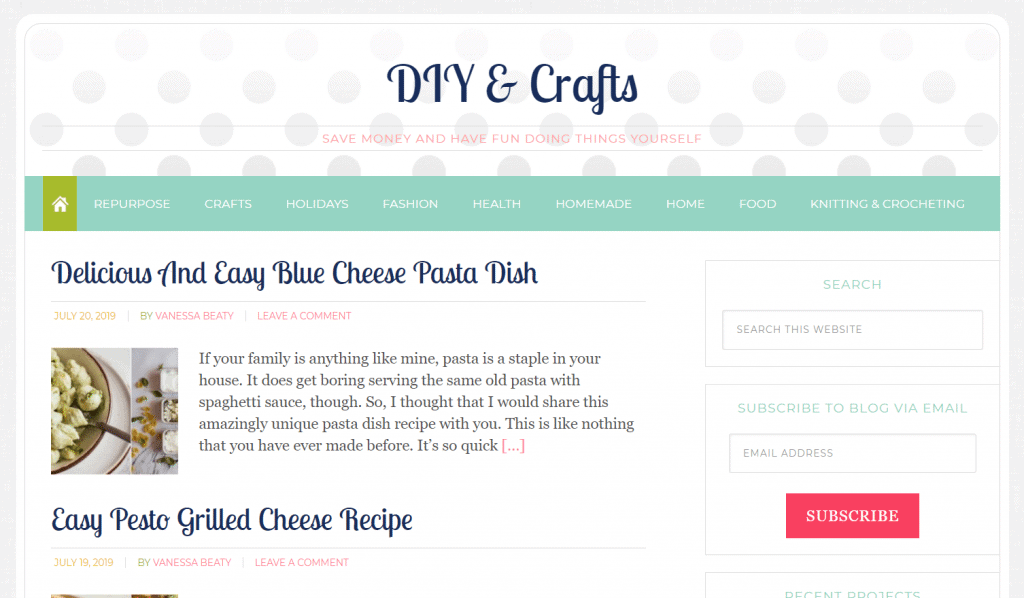
DIY & Crafts gets thousands of monthly visits to hundreds of blog posts, and many of them are based on high-volume, low-competition searches.
These topics include:
- diy t shirt cutting ideas
- what to do with old jewelry
- free crochet christmas ornament patterns
- diaper gifts for baby shower
- do it yourself pottery barn
These all get hundreds of searches each month but are considered relatively low-competition because there aren’t a lot of sites trying to target these specific searches.
Altogether, this site ranks for more than 300,000 keywords, and a good chunk of those are based on this low-competition content model.
DIY works well for parents because, well, we’re always doing stuff around the house.
Whether it’s home improvement projects, crafts with kids or figuring out what to do with all our sh*t, there are plenty of DIY things you can tackle for a blog.
Related: How to Start a DIY Blog: A Beginner’s Guide
3. Home Improvement
Similar to DIY projects, the home improvement niche is ripe with problems, which means lots of searches and content opportunities.
Where DIY is subjective to style and taste, home improvement content is more cut and dry and often based on “how to” searches.

Hunker is one site that does a great job of answering these searches with clear, easy-to-understand content and answers.
Some of the low-competition topics they get traffic for include:
- how to open garage door with broken spring
- how to get rid of ground moles with dawn soap
- how to get rid of old house smell
- how to install laminate flooring on concrete
- how to fix a sagging couch with plywood
If you’re handy around the house, this can be a great niche for parents who always have a weekend project for the house or yard.
It’s also ideal for bloggers who can create videos, even simple iPhone clips, simply because the content often lends itself well to “how to” videos.
And if you’ve ever spent any time looking up how to do something around the house on YouTube, you know how valuable it can be to have a good, clear, straight-to-the-point video.
4. Travel & Outdoors
Travel blogging is getting competitive, but like in the above markets, there are ways to produce content that will still get traffic and good revenue.
The key with travel content is to really find those unique ways that people are framing their searches, which may require more research and digging than in a straightforward niche like DIY projects.
For example, the topic of what to do in New York City is really, really competitive, so there’s not a good chance your brand new travel blog will start ranking for those searches.
You’re not going to beat out TripAdvisor, Fodors or US News.
But digging into keywords and topics, you’ll find that people are looking up “things to do in lower Manhattan,” which is a relatively low-competition topic.
If you’re familiar with the area, it may be really easy for you to create a hyper-focused article on what to do, where to stay, when to go and what to eat while you’re in Lower Manhattan.
This is exactly what The Globetrotting Teacher does.

Her travel content is focused on specific needs within travel and the outdoors.
Some other examples of her content that gets good traffic include:
- can you drive through Zion National Park?
- Utah national parks itinerary from Las Vegas
- traveling to Paris for the first time
- non touristy things to do in Paris
Carol Cain over at girlgonetravel.com also does a great job of this, and is one of the leaders in the space.
You should see a theme by now.
Instead of focusing on “Paris travel,” she’s focusing on unique ways to frame that topic.
Traveling to Paris for the first time.
Non-touristy things to do in Paris.
It’s all about how you frame your content to meet the searches people are actually making online.
If you can do that consistently, you’ll get traffic, income and eventually you’ll start to rank for more competitive searches like “things to do in Paris,” even if it takes a while.
Trust me, it’s worth the wait.
Another example of a travel site doing a good job of finding unique travel angles is The Culture Trip.

Some of their low-competition traffic topics include:
- free museums in San Francisco
- best crab cakes in Maryland
- most Instagrammable places in NYC
- best day trips from Denver
- romantic things to do in Cincinnati
There are broad, generic versions of all these searches: museums in SF, best food in Maryland, places to visit in NYC, etc.
But they’re ranking for terms that are specific and unique, and that cuts down the competition and makes their content seem perfect for that long-tail search.
You can do the same with your travel blog.
Don’t focus on the best things to do for everyone. Instead, think about the best things to do for a small, hungry-for-information market.
There’s likely a certain demographic looking for the most “Instagrammable” places somewhere.
If you can target specific searches that get searched a lot with your useful content, you’re in business.
We suggest you read:
- 50 Engaging Travel Content & Blog Post Ideas
- How to Start a Travel Blog in 6 Steps
- 35+ Travel Blog Ideas to Inspire You (Even When You’re Stuck at Home)
5. Parenting
If you’ve been a parent for more than a few minutes, you know how many questions come with the territory.

This is great news for bloggers.
The more questions = the more long-tail content you can put out there.
Of course, not every parent wants to spend their spare time thinking about parenting things, but there are plenty of bloggers who dig it.
In the parenting niche, big sites like Scary Mommy and Fatherly are examples of how much content you can produce, but even small, one-parent-band blogs can do well in this market.
Case in point: KellyMom.com, started by Kelly Bonyata, BS, IBCLC.
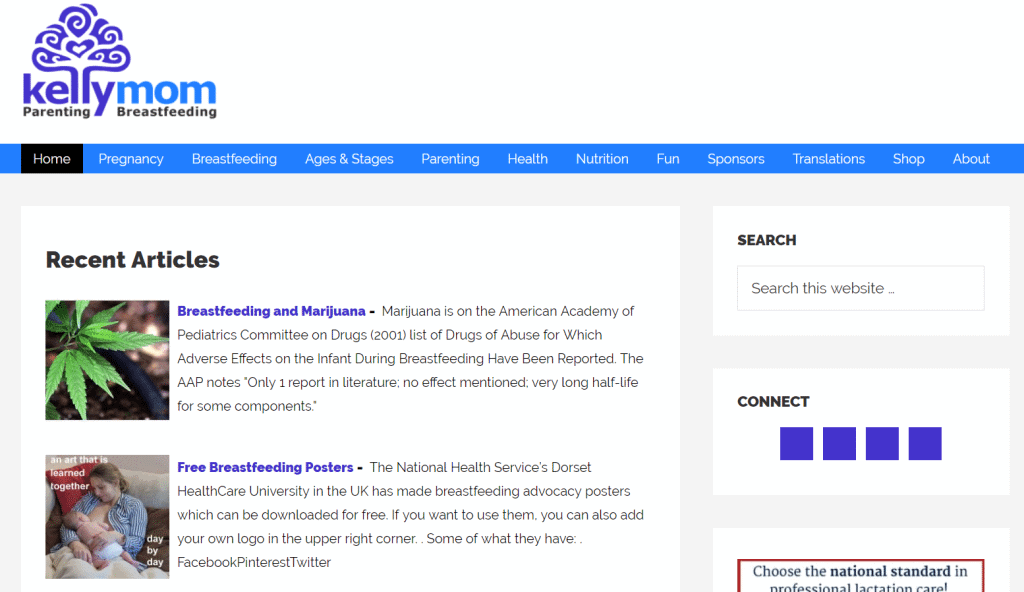
A lot of her content is related to breastfeeding in general, which is a good example of getting focused within a niche.
Still, she gets traffic for a ton of content, including low-competition topics like:
- how to wean off pumping
- can you tan while breastfeeding
- goat milk vs cow milk for babies
- do babies nurse more when teething
- how to keep baby awake while breastfeeding
One word of caution: parenting blogs often dive into health, wellness and medical content.
This isn’t bad, but you should know that Google treats these pages differently than normal informational content.
In fact, these pages have a name: YMYL pages.
Your money or your life.
“According to Google, any page including content that can affect someone’s health, happiness, safety, or financial stability is a YMYL page,” says John Lincoln, CEO of Ignite Visibility.
This is important to consider for personal finance blogs, too, but a lot of times those blogs are focused on budgeting, saving money and coupons rather than complex financial investments and decisions.
Still, it’s worth paying attention to whether or not you’re creating YMYL pages and what can happen when Google makes updates to improve the results for searches related to these pages.
If you do this incorrectly, and really get it wrong, you can even put yourself at risk for receiving a Google Penalty.
That shouldn’t scare you, and really, a lot of parenting content doesn’t have to be medical or health related.
It can be stuff related to what to make your kids for lunch, or how to teach your kids to recognize letters and so on.
Take the blog WeHaveKids, for instance.
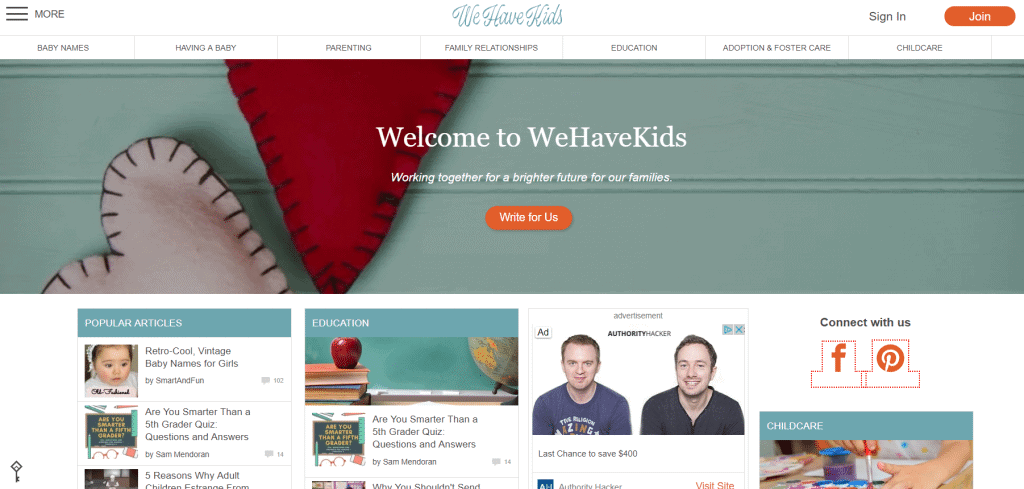
A lot of their content focuses on more generic, informational content like:
- unusual old fashioned baby boy names
- when do kids learn multiplication?
- manipulative mother in law signs
- letters from the tooth fairy
- books similar to captain underpants
These topics may be easier to write about with your own blog because you don’t need a medical background to appear as an online authority.
But anyone who’s named a kid or can research Social Security Administration’s list of popular names can put together this type of less complex information.
I’ve worked on a parenting blog before and let me tell you firsthand, there’s no end to the number or type of questions that parents look up online.
Not only that, but they look up those questions based on all sorts of scenarios, including age, weight and temperament.
If you’re looking for a niche with a seemingly endless variety of content, parenting’s a good route to go.
6. Food
Like travel, food blogging is extremely competitive, and there are sites out there that have been churning out recipes for years.
Still, it’s possible to target low-competition content topics with the right angles.
Rosemarie at The Busy Budgeter does a good job of this.

Though her blog is financially-focused, some of her top content is related to food topics, including:
- recipes using grilled chicken strips
- how to freeze cooked bacon
- lunch ideas for work for men
- easy dessert recipes for kids
- feeding a family of 6 on $50 a week
Instead of “chicken recipes,” she gets traffic for a specific type of recipe: those with grilled chicken strips.
Instead of “lunch ideas,” she gets traffic for lunch ideas for a specific group and scenario: dudes workin’.
If you can take this same approach to food content, you’ll find there’s plenty of content gaps out there still.
Again, it may take more time to find these gems, but they’re out there, and you don’t need a whole lot of them to start getting a good chunk of traffic and income.
One more example of finding super niche topics within food comes from Pinch of Yum.
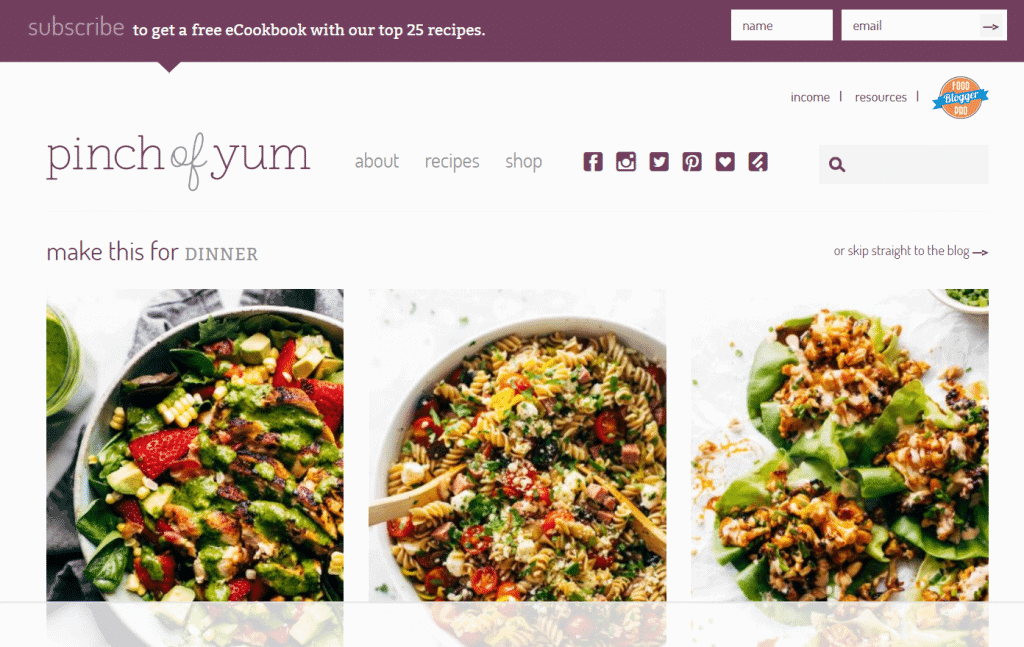
They’ve been at it for a long time and get plenty of competitive traffic, but they also rank for long-tail food searches like:
- what to make with a food processor
- healthy instant pot freezer meals
- how to make fried chicken without flour
- chocolate chip cookies with self rising flour
- how long to bake ghirardelli brownies in 9×13 pan
Pinch of Yum doesn’t necessarily have to target these searches because they have the authority, relevance and history to compete for more competitive searches, but these are all good examples of what to target when you’re just starting out.
Don’t focus on brownie recipes.

Focus on a specific type of brownie and a way to make it.
Again, you won’t always have to take this approach with content once you’re more established, but if you’re just getting started, this is a perfect strategy to jumpstart your traffic and momentum.
Related: How to Start a Food Blog – A Step-By-Step Guide Anyone Can Follow
7. Lifestyle
This is a purposely broad and vague niche, but the point of a lifestyle blog is to write about something related to your day-to-day life.
Lifestyle may include fashion, career advice, photography, hobbies, local interests (compared to general travel), religion and so on.
The advantage of a lifestyle blog is that you can cover a lot of ground and still be relevant.
The bad part is the same: you can cover a lot of ground, so it’s important to have a theme or focus within the lifestyle niche.
First example: Clean Mama.
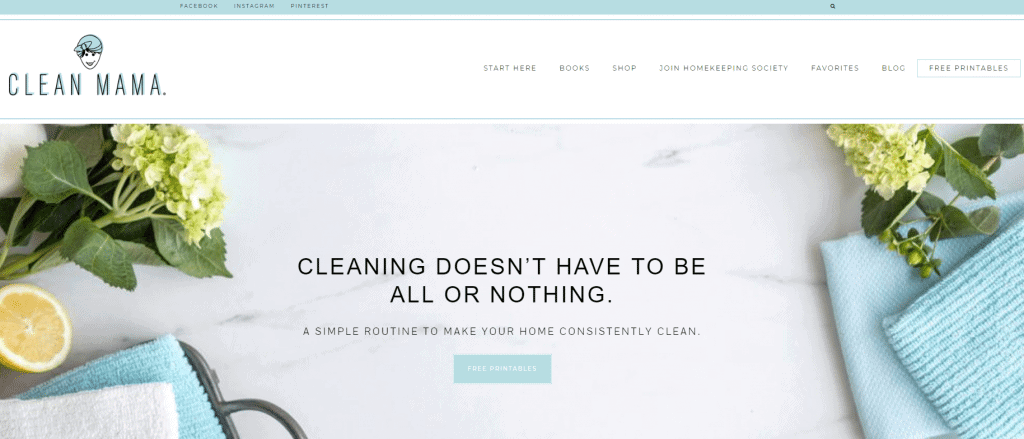
This blog focuses on good, efficient cleaning methods and strategies.
Some of the long-tail topics the site ranks for include:
- difference between duvet and comforter
- how to get motivated to clean
- how to clean baking pans in 5 minutes
- home filing categories and subcategories
- cleaning schedule for working mom
Hers may be a lifestyle blog, but within that niche the site’s focus is on cleaning, or in their words, the site’s there to “help you find a little grace in the dailies.”
Second example: Brighton the Day, a beauty and fashion blog.
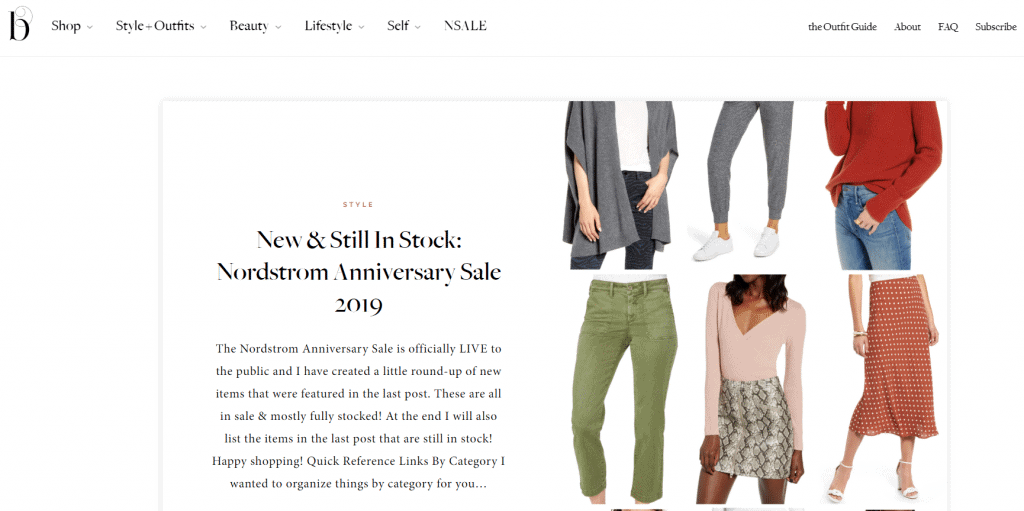
A few of their long-tail topics:
- what to wear with grey jeans
- rainy day outfits for school
- long shirts to wear with leggings
- how to wear a bandana in your hair
- what to wear to an engagement party
These are all super-niche searches that drive traffic because Brighton creates focused, valuable content targeted to specific readers.
Related:
Niche Down!
These aren’t the only profitable blog niches out there, but they offer a good place to begin if you’re just starting to blog.
They also work great for parents, students or others who have limited time or resources and need to make the most of their blogging efforts.
If you’re having trouble deciding which niche is best for you, remember that you’re in it for the long haul.
What do you want your blog (brand) to be remembered for?
What problems do you want to solve, however small?
What group of people do you want to help with useful content?
I can’t remember where I saw it, but someone on a webinar I saw once asked: what could you talk about on stage for two hours?
The point is: do something you care about.
You don’t have to necessarily be passionate about the topic, but you should care about helping others and learning more about your niche as you go.
If you’re not concerned with either of those, there’s probably a better business model out there for you.
If your only goal is to make money and you don’t care about content or solving problems, there are faster and easier ways to make money in your spare time.
Blogging isn’t easy, and it’s not fast – it takes a lot of time, attention and commitment.
But choosing the right niche can speed things up and make it a more positive and profitable experience.
Frequently Asked Questions
We’ve addressed several critical questions in this article.
But here are two more common questions in regards to mom blogs.

Why Partner with a Mom Blog?
As a business, partnering with a mom blog can be beneficial.
They have an engaged and loyal following who trust their opinions.
And if you have a great product or service, partnering with a mom blog can help promote it to their following.
This can result in more customers or clients for your business and more revenue.
How Many Mom Bloggers Are There?
There are approximately 4 million mom bloggers on the web.
Given this, it’s important to have a more specific niche when creating a mom blog.
That way, you’re able to stand out from the crowd.
Wrapping Up
In summary, mom blogs are a popular style of blogs written by mothers.
They are about topics related to parenting, motherhood, and family life.
They may also write about humorous stories, home decor, and travel with kids.
Schooling, pregnancy, and cooking are also common topics for mom blogs.
If you want to start your own mom blog, here are some key takeaways:
- Mom bloggers often make money through partnerships, affiliate marketing, products, and digital marketing.
- Digital marketing for mom blogs includes SEO, social media marketing, and email marketing.
- If you want to start an impactful mom blog, it’s essential to have a specific niche. That way, you can stand out from the 4 million other mom bloggers.
- Don’t be afraid to experiment with digital marketing to grow your blog following.
And if you’re a business, partnering with a mom blog can be beneficial for you.
This is because they have an engaged and loyal following that trusts their opinions.
Now that you know more about mom blogs, we hope you feel ready to either create your own or partner with one today!







